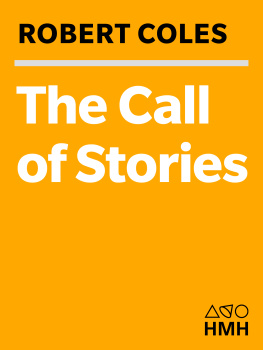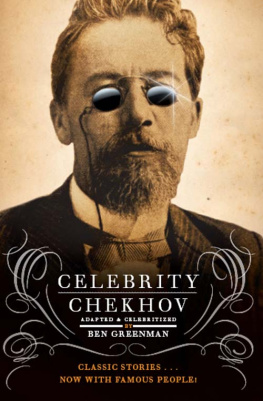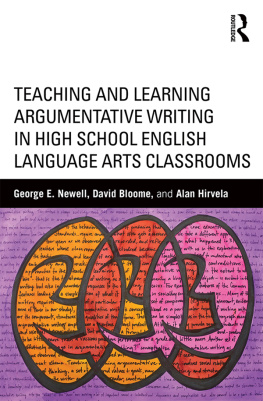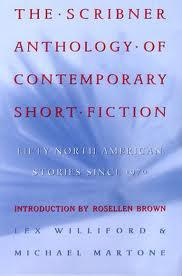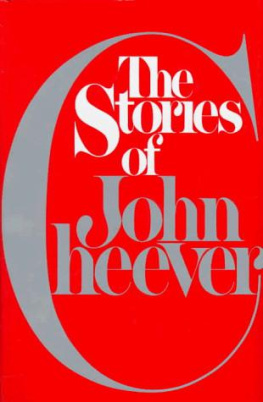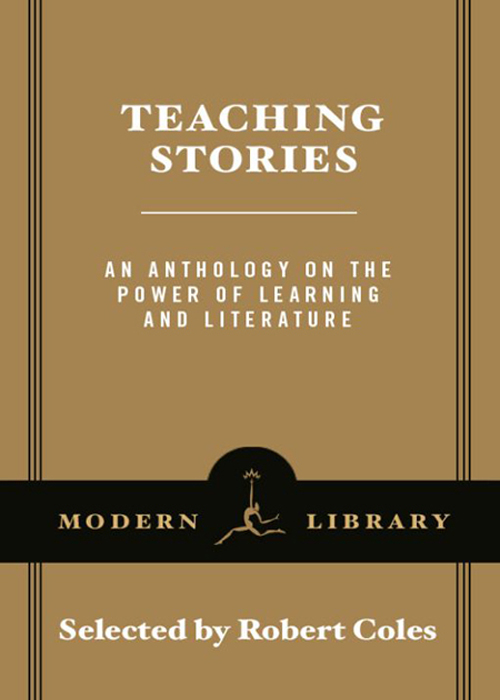
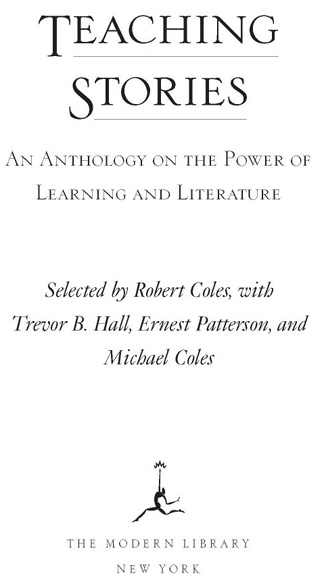
Table of Contents
We dedicate this book to our teachers and to our teaching colleagues. Many thanks to our friends at Double Take magazine, and special thanks to Beetna Kim.
INTRODUCTION
Robert Coles
What follow in the pages ahead are stories that in one way or another take the reader into a schoolroom, or ask the reader to think about all that happens when a person known as a teacher and other persons come together as students, find themselves listening, speaking, watching, writing, musing, and giving or taking tests the activity of mind and heart and soul (and of body) that occurs in the name of learning, of acquiring what gets called an education. What follows can also be described as the efforts of storytellers (essayists and novelists and poets) to render school life in all its complexity and varietyto render, as well, the ironies and paradoxes, the surprises, the baffling moments, or the revelatory ones, that visit teachers and those being taught as they collectively go through a days school routine. What follow, finally, are the readings that made up a course offered for twenty years at a graduate school of educationa seminar attended by men and women who were already teachers, who aimed to learn more so that their work might take on new or alternative directions. That course, called Writers in the Classroom, offered weekly readings in the same sequence that this book renders them: A seminars curriculum, and yes, its point of view, explicit or implied, now becomes a book for readers across time and space to consider.
In a sense this book is a novel, which might be titled A ClassroomsWorld. The parts feature particular writers whose voices, in their sum, address the reader inclined to take an interest; contemplate what sometimes happens as people read; and together have their say in response to what a writer, at a different time and place, has sent forth as her or his say. In a sense, too, this book is a play, divided into a series of acts and scenes: The drama (occasionally the melodrama or the tragicomedy or the humdrum light and amusing moments freighted now and then with tearful regret, alarm, bemusement) that unfolds is what takes place in the course of a classrooms daily life. The playwrights of such expression send words our way meant to ask or answer, to declare or refute, to push a matter further or second-guess it, all in the name of communication, exploration, discussion: those nouns meant to signify the activity that happens as we mortals address ourselves, then one another, in our time together even as the writers in the pages ahead, through the words they have offered, are keeping us company, giving us the food for thought we so often ache to have available.
One year, at the end of the seminar Writers in the Classroom, an experienced high school teacher from Illinois spoke of what she had experienced meeting, as she put it, Chekhov and Tolstoy, from nineteenth-century and early-twentieth-century Russia, Hardy, from the England of that time, and of course, in various degrees, a host of American writers who are nearer to us by virtue of when they lived and where they chose to locate their stories under what set of social, cultural, and historical circumstances. Here are that teachers concluding remarks. For us who have taught that seminars curriculum again and again, it is an apt and stirring way to introduce this book (a classs ending remarks become a books beginning aria).
Weve been experiencing an opera here in this classroom: the writers singing to us about the music that teachers and students make as they learn together, and we singing our own songs, which tell of memories, of successful leaps and big letdowns. These writers sing of themselves [as Walt Whitman put it], but they sing to us, and about us [teachers and students alike become a classrooms we]. No big-deal theories in this seminar, no paradigms, no conceptsonly our memories, our observations and participation, our concerns: ourselves, as the writers weve met, through their works, have become part of our way of seeing things, responding to one another. [A pause, then her final, brief, affecting summary:] These writers in their classrooms have given us our classrooms: to recall, to know, to anticipate coming to us, and being with us, over the years ahead.
The stories ahead were called The Teacher Stories by some who took the courseas in The Doctor Stories, which the physician and poet and storyteller William Carlos Williams once gathered for his attentive readers. Still, some of the writers whose work is presented here knew well that teachers stories, in one or another way, are also students stories; so we all reminded ourselvesthe two of us, me and Trevor Hall, who taught the course, the one of us, Michael Coles, a Montana teacher and photographer, who helped choose the stories, and Ernest Patterson, who took the course while on leave from his position as the principal of a Colorado school. For all of us over the years, these fictional narratives have been main-stays of educational enlightenmentso much so well and suggestively told. For all of us, too, the concluding remarks of Erik H. Erikson and Anna Freud have been a constant presence: Their wisdom is a pointed summons to the important task a classroom presents, as the writer Mark Edmundson makes clear in his memoir The Teacher.
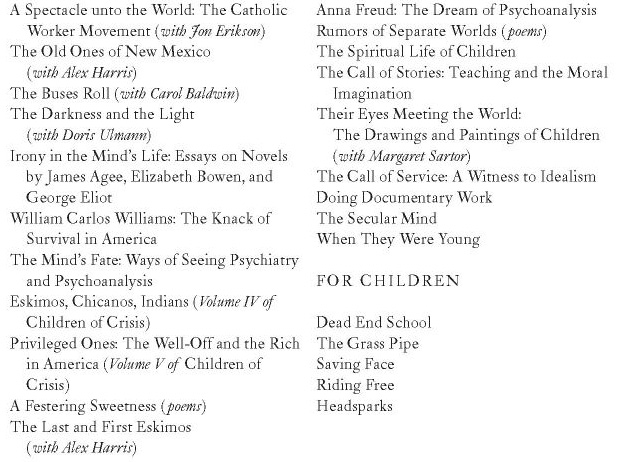
I
CHALLENGES, IRONIES, POSSIBILITIES
Here are stories of teachers trying to make do, to understand the complexity of what they are meant to offer their students, whose variousness is a constant presence, a challenge. Here, also, are moments of moral and psychological scrutiny and, on occasion, of outright confession: We see them through Baxters Miss Ferenczi, Yatess Miss Price, Wolff s portrait of academic life, Tolstoys willingness to turn the tables on himself as a teacher, and Nemerovs ode, bidding an affectionate good-bye as a prelude to his sons new life.
GRYPHON
Charles Baxter
On Wednesday afternoon, between the geography lesson on ancient Egypts hand-operated irrigation system and an art project that involved drawing a model city next to a mountain, our fourth-grade teacher, Mr. Hibler, developed a cough. This cough began with a series of muffled throat-clearings and progressed to propulsive noises contained within Mr. Hiblers closed mouth. Listen to him, Carol Peterson whispered to me. Hes gonna blow up. Mr. Hiblers laughterdazed and infrequentsounded a bit like his cough, but as we worked on our model cities we would look up, thinking he was enjoying a joke, and see Mr. Hiblers face turning red, his cheeks puffed out. This was not laughter. Twice he bent over, and his loose tie, like a plumb line, hung down straight from his neck as he exploded himself into a Kleenex. He would excuse himself, then go on coughing. Ill bet you a dime, Carol Peterson whispered, we get a substitute tomorrow.
Carol sat at the desk in front of mine and was a bad person when she thought no one was looking she would blow her nose on notebook paper, then crumple it up and throw it into the waste-basket but at times of crisis she spoke the truth. I knew Id lose the dime.
No deal, I said.
When Mr. Hibler stood us in formation at the door just prior to the final bell, he was almost incapable of speech. Im sorry, boys and girls, he said. I seem to be coming down with something.
Next page

